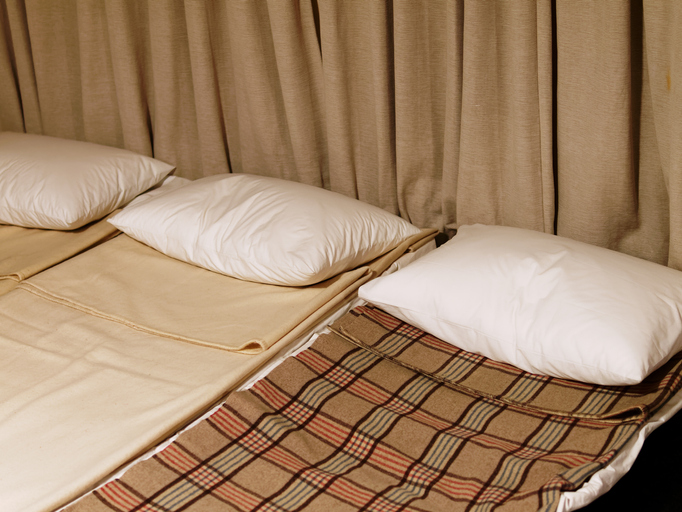
Q&A with Guy Russ, assistant vice president – Risk Control at Church Mutual Insurance Company
Why should a church consider opening its facility as a temporary shelter?
Russ: Emergency shelters and transitional living arrangements are important ways churches can help those in need. This includes providing living arrangements within worship centers, fellowship halls and educational wings for displaced or homeless families or individuals, victims of domestic violence, or others in need of shelter. Recent events such as the COVID-19 pandemic, the withdrawal from Afghanistan and Hurricane Ida highlight situations where temporary living arrangements or emergency shelter areas may be necessary.
If a church opens its doors to temporary residents, is it opening itself up to safety and security exposures?
Russ: While providing emergency shelter can do a lot of good within the community, it is important to be aware of potential safety and security exposures for worship center employees, members of the congregation, children or youth groups, guests and temporary residents. Moreover, property and liability exposures increase when people attempt to live in buildings that were not designed to provide basic living accommodations.
What supplies must a church provide to house temporary residents?
Russ: In a disaster situation, basic utilities like sewer, water, electricity and natural gas might not be available in your facility. You should decide if your building and organization are adequately prepared to provide shelter under these conditions. The most important supplies needed to provide temporary shelter during a disaster are food and water, at least a three-day supply of each. To have enough water for drinking and sanitation, think one gallon per person per day. Food should require no refrigeration, no preparation and little to no water.
Some other supplies you will need include:
- Names, addresses and telephone numbers of everyone using the facility
- Extra clothing
- Regular household bleach and medicine dropper for water decontamination
- Important documents, such as your insurance policy, in a waterproof container
- A wrench or pliers to turn off utilities if necessary
- A whistle to signal for help
- Cash and coins
- A flashlight
- Local maps
- A cellphone with text messaging capability
- A battery-powered or hand-crank radio and a NOAA Weather Radio with tone alert
- Extra batteries
- A first-aid kit
- Garbage bags, plastic ties, moist towelettes and toilet paper for personal sanitation
What advice would you give to churches that are considering providing temporary shelter?
Russ: Before allowing anyone to stay in the facility, church leaders need to check with local authorities to make sure there aren’t any zoning restrictions that prevent the worship center from providing lodging accommodations on a frequent basis.
Also, the local fire department should conduct a survey to determine if emergency exits, smoke and carbon monoxide alarms, and fire extinguishers are adequate. Consider whether the church is ADA accessible as well.
A church would need to establish rules for temporary residents. What are some you would recommend?
Russ: First, it’s important to set a limitation on the length of stay, whether it’s a week or a month or whatever church leaders decide. Rules should be posted, and copies provided and reviewed with residents as part of their orientation. Clear consequences for breaking rules need to be established and communicated.
Churches need to establish a screening process to determine who will be allowed to stay at the facility. Best practices include requiring residents to be over 18 years old, unless accompanied by a parent or legal guardian, and requiring a valid ID. Criminal background checks should be clear of any sex-related charges or convictions, with no outstanding arrest warrants.
No weapons should be allowed on the property to limit the risk of intentional or accidental injury. If smoking will be allowed, it should only be allowed in a designated exterior area. Medications must be kept in a secured area at all times.
Don’t allow residents to have visitors or overnight guests without the church’s prior approval. Also, establish minimum dress code requirements for residents when interacting with others in the building.
Determine if pets will be allowed and where on property, and what the expectations are for cleaning up pet waste.
Are there any other operational concerns a church should consider when operating a temporary shelter?
Russ: There are many issues that can come up. Church leaders need to consider a host of questions to be prepared for both expected and unexpected scenarios. Some to think about include:
- How are regular church activities going to co-exist with the shelter?
- Will the worship center be staffed 24/7 to monitor activities and residents?
- How will staff be trained to de-escalate tense situations and to recognize warning signs of a potential sexual offender?
- Does the building layout allow for securing areas of the facility that are off-limits to residents?
- How are keys or key cards controlled for building security, and when can residents enter and leave the property?
- What bathing or shower facilities are available and how will those areas be supervised when worship center members or other residents use the facility?
- Will laundering of bedding and clothing be available on-site?
- What are the limitations for using hot plates or cooking/refrigeration equipment?
- What are the restrictions for using the worship center’s telephones, computers and televisions?
- Are there agreements in place to limit the worship center’s responsibility for loss, damage or theft of a resident’s property?
- Are there agreements in place to limit the worship center’s responsibility for personal injuries to residents while staying at the property?
- What first-aid supplies will be provided and how are injuries to be treated and reported?
 Guy Russ is assistant vice president – Risk Control at Church Mutual Insurance Company, S.I. (a stock insurer), answers questions about how organizations can serve their community, while protecting the safety and security of their organization.
Guy Russ is assistant vice president – Risk Control at Church Mutual Insurance Company, S.I. (a stock insurer), answers questions about how organizations can serve their community, while protecting the safety and security of their organization.
Church Mutual is a stock insurer whose policyholders are members of the parent mutual holding company formed on 1/1/20. S.I. = a stock insurer.


